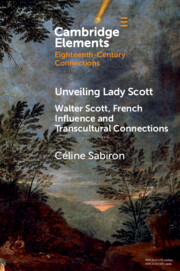Refine listing
Actions for selected content:
2248 results in Cambridge Elements

Aristippus of Cyrene, Pleasure and the Present
-
- Published online:
- 10 December 2025
- Print publication:
- 08 January 2026
-
- Element
-
- You have access
- HTML
- Export citation

Social Change across the End of the Aegean Bronze Age
-
- Published online:
- 10 December 2025
- Print publication:
- 08 January 2026
-
- Element
-
- You have access
- HTML
- Export citation

Gothic Poland and British Fiction, c. 1790–1830
-
- Published online:
- 10 December 2025
- Print publication:
- 08 January 2026
-
- Element
-
- You have access
- HTML
- Export citation

Education and Training as Improvement Interventions
-
- Published online:
- 09 December 2025
- Print publication:
- 08 January 2026
-
- Element
-
- You have access
- Open access
- HTML
- Export citation

Discourse, Materiality, and Agency within Everyday Social Interactions
-
- Published online:
- 06 December 2025
- Print publication:
- 08 January 2026
-
- Element
-
- You have access
- HTML
- Export citation

Translating His-stories
-
- Published online:
- 06 December 2025
- Print publication:
- 08 January 2026
-
- Element
-
- You have access
- HTML
- Export citation

Music at a Florentine Convent
- The Biffoli-Sostegni Manuscript and Suor Maria Celeste Galilei
-
- Published online:
- 06 December 2025
- Print publication:
- 31 January 2026
-
- Element
- Export citation

Modelling the Divine
-
- Published online:
- 05 December 2025
- Print publication:
- 08 January 2026
-
- Element
-
- You have access
- HTML
- Export citation

Politics in a Pandemic
- Governance and Crisis Management in Southeast Asia
-
- Published online:
- 05 December 2025
- Print publication:
- 08 January 2026
-
- Element
-
- You have access
- HTML
- Export citation

Creative Construction Grammar
-
- Published online:
- 05 December 2025
- Print publication:
- 08 January 2026
-
- Element
-
- You have access
- Open access
- HTML
- Export citation

State Platform Capitalism
- The United States, China, and the Global Battle for Digital Supremacy
-
- Published online:
- 05 December 2025
- Print publication:
- 08 January 2026
-
- Element
-
- You have access
- Open access
- HTML
- Export citation

Race Class
- Reading Mexican American Literature in the Era of Neoliberalism, 1981-1984
-
- Published online:
- 04 December 2025
- Print publication:
- 08 January 2026
-
- Element
-
- You have access
- HTML
- Export citation

Charting Translation Reception
- Methods and Challenges
-
- Published online:
- 02 December 2025
- Print publication:
- 08 January 2026
-
- Element
-
- You have access
- Open access
- HTML
- Export citation

The Transformation of Protest Politics
-
- Published online:
- 02 December 2025
- Print publication:
- 08 January 2026
-
- Element
- Export citation

The Elixir
- A Posthumanist Approach to Alchemy in Akbarian Sufism and Islam
-
- Published online:
- 30 November 2025
- Print publication:
- 08 January 2026
-
- Element
- Export citation

Empire, Extraction and Power in the Festivals of Britain of 1951 and 2022
-
- Published online:
- 30 November 2025
- Print publication:
- 08 January 2026
-
- Element
- Export citation

Disenchanting the Senses
- Sulfuric Discourse and the World System
-
- Published online:
- 28 November 2025
- Print publication:
- 08 January 2026
-
- Element
- Export citation

Unveiling Lady Scott
- Walter Scott, French Influence and Transcultural Connections
-
- Published online:
- 26 November 2025
- Print publication:
- 04 December 2025
-
- Element
- Export citation

How Urbanism Changes Foodways
-
- Published online:
- 26 November 2025
- Print publication:
- 08 January 2026
-
- Element
- Export citation

The Fascist Zenith
- War and Dictatorship under Axis Rule
-
- Published online:
- 26 November 2025
- Print publication:
- 11 December 2025
-
- Element
- Export citation
